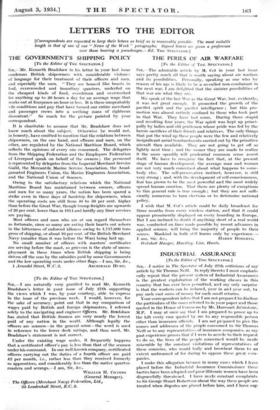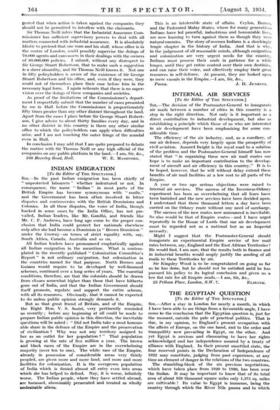INDUSTRIAL ASSURANCE
[To the Editor of THE SPECTATOR.] SIR,—I notice in The Spectator of July 27th criticisms of my article by Sir Thomas Neill. In reply thereto I most emphati- cally repeat that the present system of Industrial Assurances is the greatest exploitation of the working classes in this country that has ever been permitted, and my only surprise is that the workers can be induced, year in and year out, to pay such vast sums of money for such small returns.
Your correspondent infers that I am not prepared to disclose the particulars of the cases referred to in your paper and those quoted in the House of Commons by Mr. Harcourt Jo!instone, M.P. I may at once say that I am prepared to prove up to the hilt every case quoted by me to any responsible person other than insurance officials. I am not prepared to give the names and addresses of the people concerned to Sir Thomas Neill or to any representatives of insurance companies, as my past experience proves that if I were to accede to their request to do so, the lives of the people concerned would be made miserable by the constant visitations of representatives of these concerns, who would bully and browbeat them to an extent undreamed of for daring to oppose these great com- panies.
I make this allegation because in many eases which I have placed before the Industrial Assurance Commissioner these tactics have been adopted and poor illiterate women have been disgracefully threatened. I have mode constant complaints to Sir George Stuart Robertson about the way these people are treated when disputes are placed before him, and I have sug- gested that when action is taken against the companies they should not be permitted to interfere with the claimants.
Sir Thomas Neill infers that the Industrial Assurance Com- missioner has sufficient supervisory powers to deal with all matters connected with industrial assurance. It is absolutely idiotic to pretend that one man and his staff, whose office is in the centre of London, could possibly supervise the doings of 70,000 agents and canvassers in their dealings with the owners of 80,000,000 policies. I submit, without any disrespect to Sir George Stuart Robertson, that to make such a suggestion is a sheer absurdity, and Sir Thomas Neill knows it. Not one in fifty policyholders is aware of the existence of Sir George Stuart Robertson and his office, and, even if they were, they could not of themselves place their case before him in the necessary legal form. I again reiterate that there is no super- vision over the doings of these companies and societies.
As proof of the limitations of the Commissioner's depart- ment I respectfully submit that the number of cases presented by me in Hull before the Commissioner is proportionately fifty times greater than any other district throughout the land. Apartfrom the eases I place before Sir George Stuart Robert- son, I give advice to about thirty families every day, and in no other district in this country is there any other similar office to which the policyholders can apply when difficulties arise, and I am not touching the outer fringe of the scandal even in Hull.
In conclusion I may add that I am quite prepared to debate the matter with Sir Thomas Neill or any high official of the companies on any public platform in the land.—I am, Sir, &c.,































 Previous page
Previous page